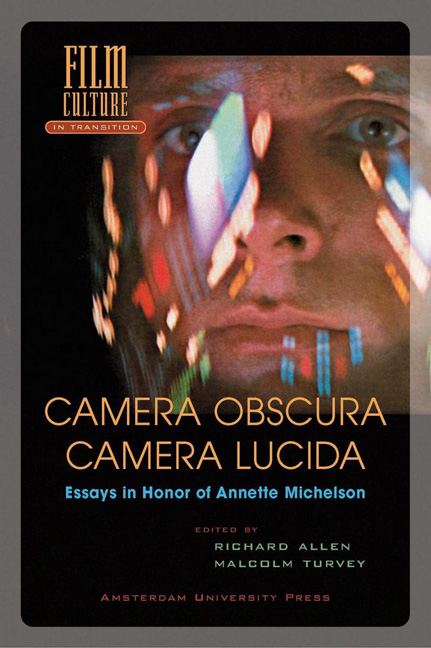Book contents
- Frontmatter
- Contents
- Acknowledgements
- Preface
- Introduction
- The Logic of an Illusion: Notes on the Genealogy of Intellectual Cinema
- Narcissistic Machines and Erotic Prostheses
- Loïe Fuller and the Art of Motion: Body, Light, Electricity and the Origins of Cinema
- Visitings of Awful Promise: The Cinema Seen from Etna
- Transfiguring the Urban Gray: László Moholy-Nagy’s Film Scenario ‘Dynamic of the Metropolis’
- Eisenstein’s Philosophy of Film
- Knight’s Moves
- Hitchcock and Narrative Suspense: Theory and Practice
- From the Air: A Genealogy of Antonioni’s Modernism
- Dr. Strangelove: or: the Apparatus of Nuclear Warfare
- Collection and Recollection: On Film Itineraries and Museum Walks
- Afterward: A Matter of Time: Analog Versus Digital, the Perennial Question of Shifting Technology and Its Implications for an Experimental Filmmaker’s Odyssey
- Select Bibliography
- List of Contributors
- Index
- Film Culture in Transition General Editor: Thomas Elsaesser
Preface
Published online by Cambridge University Press: 25 January 2021
- Frontmatter
- Contents
- Acknowledgements
- Preface
- Introduction
- The Logic of an Illusion: Notes on the Genealogy of Intellectual Cinema
- Narcissistic Machines and Erotic Prostheses
- Loïe Fuller and the Art of Motion: Body, Light, Electricity and the Origins of Cinema
- Visitings of Awful Promise: The Cinema Seen from Etna
- Transfiguring the Urban Gray: László Moholy-Nagy’s Film Scenario ‘Dynamic of the Metropolis’
- Eisenstein’s Philosophy of Film
- Knight’s Moves
- Hitchcock and Narrative Suspense: Theory and Practice
- From the Air: A Genealogy of Antonioni’s Modernism
- Dr. Strangelove: or: the Apparatus of Nuclear Warfare
- Collection and Recollection: On Film Itineraries and Museum Walks
- Afterward: A Matter of Time: Analog Versus Digital, the Perennial Question of Shifting Technology and Its Implications for an Experimental Filmmaker’s Odyssey
- Select Bibliography
- List of Contributors
- Index
- Film Culture in Transition General Editor: Thomas Elsaesser
Summary
Annette Michelson returned to New York from France in the mid-1960s with an intimate knowledge of French language and culture. This meant, among other things, that a whole world of intellectual speculation was open to her that remained closed to less linguistically gifted American colleagues. In the late ‘60s, the translation business had not yet geared up to process the work of Barthes, Saussure, Lévi-Strauss, and Derrida into English; and so the Structuralist reconception of language – in all its subtlety and elegance – had not yet impacted the world of aesthetic discourse. In 1970, in Art and the Structuralist Perspective, her lecture at the Guggenheim Museum, Michelson spoke of the elegance and reduction of Structuralist diagrams in an effort to fuse cultural practice and this new domain of conceptualization. In closing, she passed to what she saw as the disappointment of Structuralism's hostility to abstract art, a philistinism unworthy of the movement's extraordinarily formal thinkers.
Michelson's critical project had, from her entry into New York's thriving art world, committed itself to those painters, sculptors, and dancers whose work would have been most recalcitrant to these Parisian heroes even though, in her eyes, it should in fact have been most available to the proponents of system, exchange, and the formalization of meaning.
In January 1967, Michelson eagerly reviewed an exhibition that her colleagues at Artforum shunned from a sense of its difficulty, its closure against the universe of discourse. This was ‘10 x 10,’ an exhibition at the Dwan Gallery of the work of Agnes Martin, Robert Smithson, Robert Morris, Carl Andre, Jo Baer, Ad Reinhardt, and Michael Steiner – the burgeoning movement of Minimalism which Michelson had embraced immediately upon her arrival. Her review spoke of this difficulty and the way it had produced the vocabulary of dismissal in the early critical literature, as words such as ‘rejective,’ ‘aggressive,’ and ‘boring’ were applied to it. Her assessment of the situation was quickly stated: ‘The problem, as I see it, is the increasingly urgent necessity of some conceptual or philosophical framework within which criticism can propose a comprehension of the dynamics of art history and of art making.’
- Type
- Chapter
- Information
- Camera Obscura, Camera LucidaEssays in Honor of Annette Michelson, pp. 9 - 12Publisher: Amsterdam University PressPrint publication year: 2003



